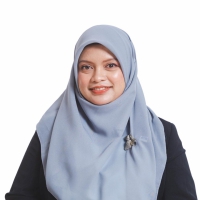‘Surprised, scared… cried right away, what is happening?’ This is how Nadia,[1] a sixth grade student in Jakarta, felt when she saw blood staining her underwear. Nadia is certainly not alone. Seventy of the 75 students we interviewed said they felt uncomfortable when they first had their period – fear, shock, confusion, crying and even screaming for their mother.
In another case, 5 times Nita[2] came home from school early. Her sanitary pads felt full, and blood seeped through her skirt on the first day of menstruation at school. Nita came home early because she did not bring a spare sanitary pad to school, fearing that she might be ridiculed by her male friends who often open the bags of female students without permission to borrow things. Meanwhile, Aster[3] also chooses not to change her sanitary pads at school because the toilets are dirty and the doors are broken.
Menstruation is natural for women, but it can be an unpleasant experience if adolescent girls are not prepared for it and their environment does not provide adequate support.
Fulfilling menstrual needs amounts to fulfilling women’s rights
Menstrual health influences women’s quality of life because it has the potential to affect their health (reproductive and pregnancy), educational participation, and in the long term it even affects their work participation. Fulfilling the right to health and menstrual hygiene for adolescent girls also means ensuring the fulfillment of children’s rights to live, grow, develop and participate optimally.
During menstruation, women need to manage their hygiene, including changing their sanitary napkins every 4 hours, washing hands with soap before and after changing sanitary napkins, and wrapping sanitary napkins with plastic/paper bags before throwing them in the trash. They also need to know about the reproductive cycle, the physical, hormonal and emotional changes that occur, and manage their biological (menstrual pain) and psychological condition during menstruation.
To ensure the fulfillment of women’s menstrual hygiene rights, a rights-based holistic intervention is needed. Fulfilling the right to proper water and sanitation facilities is not enough. To be able to experience menstruation comfortably, it is necessary to fulfil the rights of women (especially teenagers and adolescents) to information to form knowledge, skills and attitudes in dealing with menstruation. It is also necessary to form the attitude of peers, especially male friends, so that girls who are menstruating are no longer subject to bullying. It is also necessary to create societal norms that no longer treat menstruation as a taboo, so that the transfer of knowledge and skills to adolescent girls can occur properly. The view that menstruation is dirty and prohibitions related to menstruation, such as the prohibition on entering gardens in East Nusa Tenggara (NTT), also require intervention because they discriminate against women in public spaces.
Based on the research we conducted regarding the experiences of adolescents in dealing with menstruation in 3 districts/cities in Indonesia, the holistic fulfillment of menstrual health needs is still lacking. Education by parents, teachers and health workers of adolescent girls has not been carried out properly, and male students still like to mock female friends who are menstruating. In some areas in West Nusa Tenggara (NTB) and NTT, menstruation is still considered dirty and discussion among children and adults is taboo. For example, there are teachers who refuse to teach science subjects related to reproductive organs in the classroom, and even approved by the school’s principal. Those who are supposed to protect girls’ rights to study are silent and consider it ‘reasonable’ that such subjects are not taught.
Interventions to support MHM practice for adolescent girls
Seeing the fact that the Menstrual Hygiene Management (MHM) issue has not received the special attention it deserves, Plan International Indonesia Foundation (Plan Indonesia) sought to meet the challenges of managing menstrual hygiene faced by adolescent girls by designing holistic interventions. These interventions not only aim to build safe and comfortable toilet infrastructure, but also build support from the surrounding environment through education of various parties. The toilets built by Plan Indonesia are called ‘MKM[4] toilets’ and are equipped with waste bins, hand soap, spare sanitary napkins and spare skirts.[5]
In building environmental support, the forms of intervention implemented by Plan Indonesia vary depending on the audience. For health workers at the district level, the education process begins with the implementation of training of trainers (ToT) related to MHM. In some areas, these workshops were also attended by representatives of teachers and students. At the school level, MHM education is carried out in the form of workshops attended by teachers, principals, and parent representatives. This workshop aims to raise awareness about the importance of support from people around adolescent girls to help them deal with menstruation and maintain menstrual hygiene.
To attract the attention of students, including male students, the outreach was made more attractive by using theatrical performances (traditional lenong) as media. This theatre performance addressed topics such as explanation of menstruation, how to maintain cleanliness during menstruation, and admonishing the bullying of female students who are menstruating. Through this educational strategy it is hoped that sensitive information will become easier to understand.
What lessons can be learned?
We found that intervention programs related to MHM issues, such as those carried out by Plan Indonesia, have had a positive impact. In some intervention schools, principals, school committees, teachers, female students and even male students were more open to discussing the topic of menstruation. In addition, the availability of safe, accessible and comfortable restrooms have encouraged female students to change sanitary pads at school rather than return home. As a result, attendance of female students in intervention schools than non-intervention schools. Indirectly, this intervention program supports the right of female students to equal access to education.
Although positive impacts of the intervention are already visible, many challenges remain. First, there are still parents who do not feel the need to provide information about menstruation to their sons. In fact, the negative attitudes of male students, expressed for example through bullying, can affect female students in practicing MHM.
Additionally, adults around the students, including teachers and parents, might still fail to implement good MHM practices, such as changing sanitary pads frequently and washing hands before and after. How can the people who should be the first/main source of MHM information for adolescents provide adequate education if they do not practice good menstrual hygiene themselves?
When interventions can only be carried out within a limited time frame, the program needs to consider an exit strategy[6] to ensure the sustainability of the practice even after the intervention is completed. In this study, the exit strategy must ensure that those around adolescent girls take sustainable steps to conduct education related to MHM. In the intervention schools, there was no school policy to continue providing MHM information to female students after the Plan Indonesia program ends. Health workers also did not continue the implementation of MHM socialisation to schools.
Lastly, female students in intervention schools have not practiced all aspects of MHM well. They frequently still use sanitary pads for a long time (not changing every 4 hours) and rarely practice hand washing with soap before changing sanitary pads. This indicates that information-based interventions that are carried out only once, such as through drama performances, have not had a direct lasting impact to change behaviour among adolescents. Beliefs and cultures that view menstruation negatively also remains a factor that prevent adolescents from knowing and performing MHM.
What do we need to do going forward?
The PLAN program opened our eyes to the fact that many adolescent girls are not ready to deal with menstruation, that supporting them is our responsibility, and that there is a lot of room for improvement in this matter.
Stakeholders and the community have a responsibility to ensure a safe and comfortable learning environment for all students, including female students who have the right to a school environment that can ensure MHM. In designing interventions to improve MHM practice, it is also important to look at the diversity of conditions of adolescent girls, such as youth with disabilities or youth from certain welfare groups that affect MHM practice.
Specifically highlighting the issue of availability of toilets, although there is a Minister of National Education Regulation[7] which stipulates the standard of facilities and infrastructure for primary and secondary schools (SD/MI, SMP/MTs and SMA/MA), questions still remain as to whether the toilets provided meet the standards. Our study found that in some schools, toilets were in poor condition. Such conditions suggest there is a lack of attention to MHM issues and an awareness among the community, especially in schools, that MHM has a major impact on the fulfillment of girls’ rights to education.
Education for teachers and parents who are the first/main sources of information for adolescents regarding menstruation needs to be carried out not only to provide information, but also to encourage them to practice MHM well themselves, and create a more positive perspective and attitudes towards menstruation.
Small things that schools can do but are very valuable for female students include ensuring that male students and male teachers do not use female toilets; ensuring all toilet infrastructure is accessible to persons with disabilities; ensuring clean water and soap is available; placing waste bins and plastic/paper wrappings inside the toilet block; and providing uniforms, spare sanitary pads and underwear that can be used by students who are menstruating, at least at the school clinic.
General education should not take a back seat to practical considerations: young women often have a myriad of unanswered questions.
Why does menstruation suddenly come and suddenly disappear? Why are menstrual cycles irregular? What is the normal color of menstruation (red or brown)? How to use sanitary pads so they don't leak, how many times do you have to change sanitary pads? How do you clean dirty sanitary pads properly, and how do you maintain cleanliness, health and comfort during menstruation? What types of sanitary pads are good and safe according to your health? Can feminine soap really clean genital area and is there any effect on female health? Can a woman who is menstruating get pregnant if she sits close to a male friend?
Education should help them to understand and deal with menstruation properly. Adolescent girls’ anxieties and fears regarding menstruation, blood and ridicule from male friends, deserve to be treated as important and addressed immediately. This is the time for parents, teachers, school principals, the government and all of us to make all young girls, including girls with disabilities, ready and able to manage their menstrual hygiene properly. Understanding MHM issues as a shared responsibility means that we are one step ahead in fulfilling women's rights to health and education on equal terms.
[1] Pseudonym
[2] Pseudonym
[3] Pseudonym
[4] MKM is the Indonesian language equivalent of MHM.
[5] The initial stage of intervention has not accommodated inclusive development. That way, the research does not look at the disability aspect and does not involve respondents with disabilities.
[6] An exit strategy is an effort to ensure that the positive impact of an intervention can continue even after the program concludes.
[7] Minister of National Education Regulation No. 24 of 2007 concerning Standards, Facilities and Infrastructure for Primary Schools (SD/MI), Secondary Schools (SMP/MTs), and High Schools Aliyah (SMA/MA).







